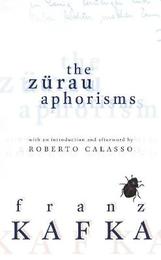
|
The Zurau Aphorisms
Paperback / softback
Main Details
| Title |
The Zurau Aphorisms
|
| Authors and Contributors |
By (author) Franz Kafka
|
| Physical Properties |
| Format:Paperback / softback | | Pages:160 | | Dimensions(mm): Height 199,Width 110 |
|
| Category/Genre | Prose - non-fiction |
|---|
| ISBN/Barcode |
9781846558382
|
| Classifications | Dewey:838.91208 |
|---|
| Audience | |
|---|
|
Publishing Details |
| Publisher |
Vintage Publishing
|
| Imprint |
Harvill Secker
|
| Publication Date |
24 February 2014 |
| Publication Country |
United Kingdom
|
Description
Kafka's rediscovered notebooks- a distillation of the master at his most powerful and enigmatic Franz Kafka spent eight months at his sister's house in Z rau between September 1917 and April 1918, enduring the onset of tuberculosis. Illness paradoxically set him free to write, in a series of philosophical fragments, his settling of accounts with life, marriage, his family, guilt and man's condition. These aphorisms have appeared with minor revisions in various posthumous works since his death in 1924. By chance, Roberto Calasso rediscovered Kafka's two original notebooks in Oxford's Bodleian Library.The notebooks, freshly translated and laid out as Kafka intended, are a distillation of Kafka at his most powerful and enigmatic. This lost jewel provides the reader with a fresh perspective on the work of a genius.
Author Biography
Franz Kafka (1883-1924) was born into a Jewish family in Prague. In 1906 he received a doctorate in jurisprudence, and for many years he worked a tedious job as a civil service lawyer investigating claims at the State Worker's Accident Insurance Institute. He never married, and published only a few slim volumes of stories during his lifetime. Meditation, a collection of sketches, appeared in 1912; The Stoker- A Fragment in 1913; Metamorphosis in 1915; The Judgement in 1916; In the Penal Colony in 1919; and A Country Doctor in 1920. The great novels were not published until after his death from tuberculosis- America, The Trial and The Castle.
ReviewsThe Dante of the Twentieth Century -- W. H. Auden
|